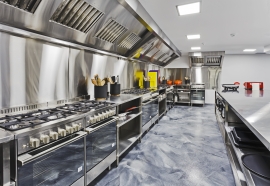Molds and mildews are fungi that can cause various illnesses in humans. In the food business, it is important to take preventative steps to ensure these organisms do not contaminate the product. There are six main ways to prevent molds and mildew from affecting your food business.
Proper Ventilation is Key
Ventilation is an important but often overlooked aspect of commercial kitchen design. Not only does it play a vital role in maintaining air quality, but it also helps to keep kitchen temperatures consistent and comfortable for staff.
If you are planning to open a food business, consider ventilation carefully. This could be in the form of an exhaust hood, open windows, or fans. Work with a professional kitchen designer to ensure your kitchen has adequate airflow. Taking this step can help create a safer and more pleasant work environment for your employees and also help protect your food products from fungal contamination.
Keep Food Storage Areas and Equipment Clean and Dry
Any restaurant kitchen worth its salt will have strict rules in place regarding food storage and equipment. This is not only because it is important to keep things clean and organized but also because it helps prevent the spreading of bacteria and other contaminants.
If food is left out in the open or stored in dirty containers, it is more likely to become contaminated. Prevent this from happening by always storing food in sealed, airtight containers and ensuring all equipment is regularly cleaned and dried. You can also use a food-grade mold inhibitor to keep stored food from becoming contaminated.
Inspect Food Regularly for Signs of Mold or Mildew
One of the most common causes of food spoilage is mold or mildew growth. While mold spores are present in the air at all times, they only become a problem when they land on a suitable food source, such as bread or fruit. If left unchecked, mold can spread quickly, making the food unsuitable for consumption. Inspect for the following signs:
If one of these signs is found, food should be discarded immediately to prevent the spread of contamination. You may feel as if you have lost some money, but the health of your customers is far more important than a few dollars.

Use Proper Sanitation Procedures
Foodborne illnesses are a serious public health concern, and food service businesses must take steps to prevent them. There are several ways to do this, but one of the most important is to practice proper sanitation. This means regularly cleaning and disinfecting all surfaces that come into contact with food, utensils, and equipment. Employees should also wash their hands regularly and wear protective clothing when handling food.
Remember also that equipment used for meat should not be used for vegetables, and vice versa. In addition, all food service workers should be properly trained in food safety procedures and practice good personal hygiene habits. Regular training should be held every few months to ensure everyone is up-to-date on food safety protocol.
Train Employees on How to Identify and Prevent Molds and Mildew
Molds are usually green, black, or brown, and they can appear fuzzy or slimy. They thrive in bathrooms, kitchens, and basements in damp, warm environments. Mildews, however, is usually white or gray and have a powdery texture. They typically grow on surfaces that are already moldy.
Employees should be trained to watch for early signs of growth to prevent molds and mildews from taking over their workplace. They should also know how to properly clean and dry areas that have been wet or humid to prevent mold and mildew from taking hold. Lastly, they should know what to do with food contaminated with molds and mildew, as these are risky when consumed.
Manage Moisture Levels in the Kitchen
As a restaurant owner, you know that one of the most important factors in keeping your business running smoothly is managing moisture levels. Too much moisture can lead to mold and mildew growth, damaging your walls and ceilings and creating a hazardous environment for your employees and customers. On the other hand, insufficient moisture can cause your food to dry out, affecting its taste and appearance.
The key to maintaining optimal moisture levels is using moisture mitigation systems. Not only do these systems help to regulate humidity levels by removing excess moisture from the air, but they also direct it out of the kitchen. In addition, they work to prevent water vapor from seeping into the flooring system, which often leads to mold growth or staining. By keeping the moisture level in check, you can maintain a safe, healthy business environment for everyone.
By following these six tips, you can help prevent the growth of molds and mildews in your kitchen and keep your food safe. Molds and mildews can cause serious health problems, so it is important to be vigilant in preventing their growth.

Be the first to comment on "6 Ways to Prevent Molds and Mildew in the Restaurant Kitchen"